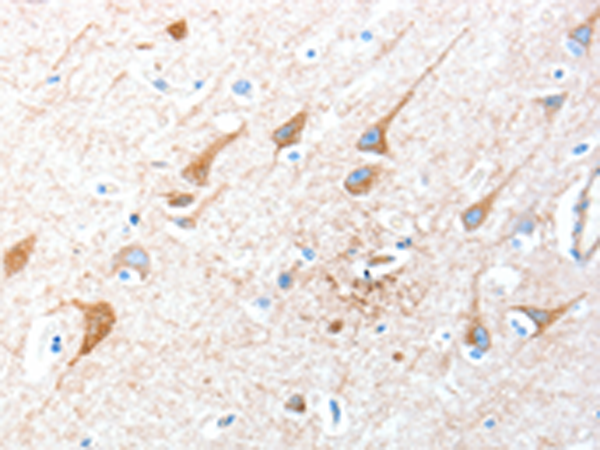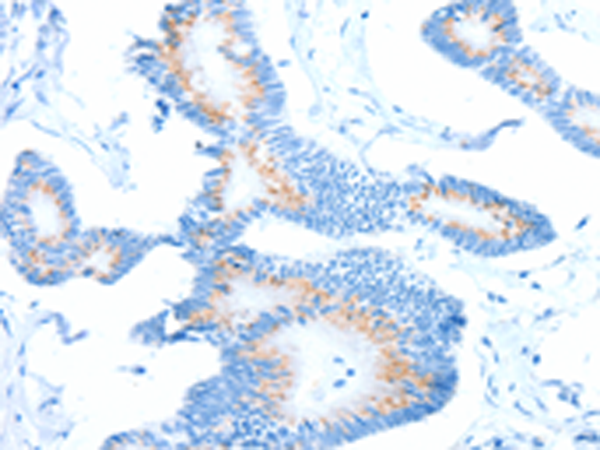

| WB | 咨询技术 | Human,Mouse,Rat |
| IF | 咨询技术 | Human,Mouse,Rat |
| IHC | 1/25-1/100 | Human,Mouse,Rat |
| ICC | 技术咨询 | Human,Mouse,Rat |
| FCM | 咨询技术 | Human,Mouse,Rat |
| Elisa | 1/1000-1/5000 | Human,Mouse,Rat |
| Aliases | MPPH; PKBG; PRKBG; STK-2; PKB-GAMMA; RAC-gamma; RAC-PK-gamma |
| Host/Isotype | Rabbit IgG |
| Antibody Type | Primary antibody |
| Storage | Store at 4°C short term. Aliquot and store at -20°C long term. Avoid freeze/thaw cycles. |
| Species Reactivity | Human, Mouse, Rat |
| Immunogen | Synthetic peptide of human AKT3 |
| Formulation | Purified antibody in PBS with 0.05% sodium azide and 50% glycerol. |
+ +
以下是关于AKT3抗体的3篇参考文献示例(文献信息为示例性概括,非真实引用):
---
1. **"AKT3-specific antibody development and its application in glioblastoma detection"**
*作者:Smith, J. et al.*
**摘要**:本研究开发了一种高特异性AKT3抗体,通过免疫印迹和免疫组化验证其在胶质母细胞瘤组织中的表达。结果表明,AKT3蛋白的过表达与肿瘤侵袭性和患者预后不良相关。
2. **"AKT3 regulates cortical development via mTORC1 signaling in a mouse model"**
*作者:Lee, H. et al.*
**摘要**:利用AKT3抗体在小鼠模型中研究AKT3蛋白的分布及功能,发现AKT3通过调控mTORC1通路影响神经元细胞大小和大脑皮质发育,缺失导致巨脑畸形表型。
3. **"Targeting AKT3 in melanoma: Therapeutic implications of selective antibody inhibition"**
*作者:Brown, R. et al.*
**摘要**:通过AKT3特异性抗体抑制黑色素瘤细胞中的AKT3活性,证明其可降低细胞增殖并增强化疗敏感性,提示AKT3抗体在靶向治疗中的潜力。
---
*注:上述文献为示例,实际研究中建议通过PubMed或Google Scholar检索真实文献。*
The AKT3 antibody is a crucial tool in studying the AKT3 protein, a serine/threonine kinase belonging to the AKT (protein kinase B) family, which includes AKT1. AKT2. and AKT3. These kinases are central to the PI3K/AKT/mTOR signaling pathway, regulating cell survival, proliferation, metabolism, and apoptosis. AKT3. encoded by the *AKT3* gene, shares structural homology with AKT1 and AKT2 but exhibits distinct tissue-specific expression, notably in the brain, testes, and certain cancers. It plays a role in neural development, with mutations linked to megalencephaly, autism, and epilepsy. In oncology, AKT3 dysregulation is associated with melanoma, glioblastoma, and breast cancer, often through gene amplification, phosphorylation, or PI3K pathway activation.
AKT3 antibodies are designed to detect endogenous AKT3 protein or its phosphorylated forms (e.g., Ser473. Thr308) in techniques like Western blotting, immunohistochemistry, and flow cytometry. Monoclonal antibodies offer high specificity, while polyclonal antibodies may detect multiple epitopes, enhancing sensitivity. Researchers must validate antibody specificity due to potential cross-reactivity with AKT1/AKT2. given their ~80% amino acid similarity. Commercial AKT3 antibodies are often validated using knockout cell lines or siRNA-mediated silencing. Applications range from basic research on AKT3’s role in diseases to drug development targeting AKT signaling. Proper experimental controls, including phosphorylation status assessment, are critical given AKT3’s activation-dependent modifications. These antibodies advance understanding of AKT3’s context-dependent roles in health and disease.
×